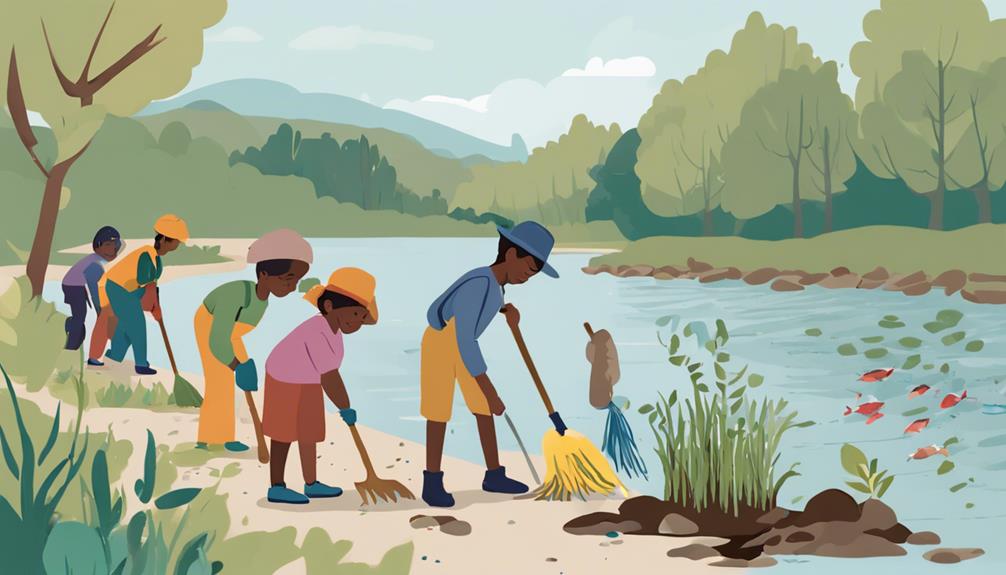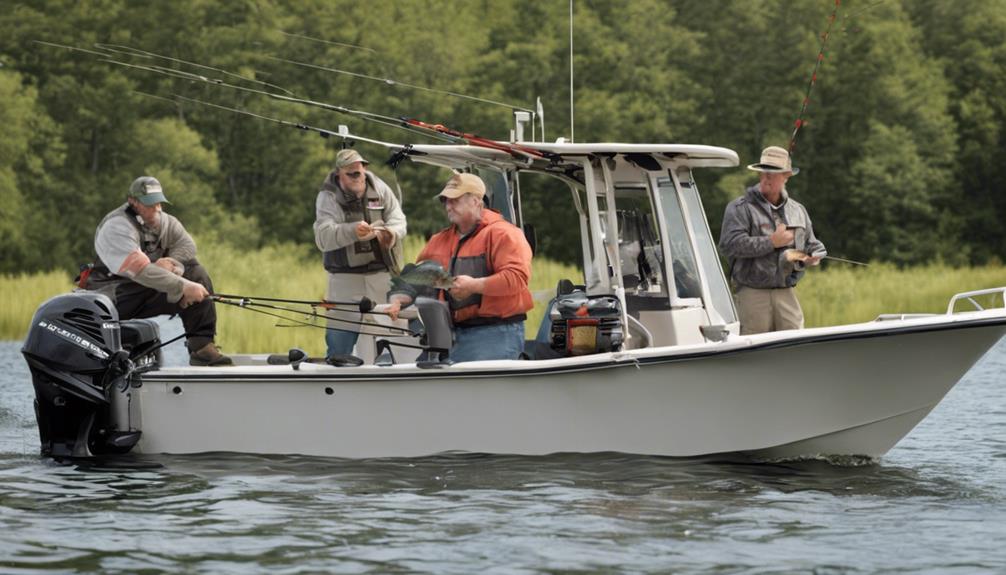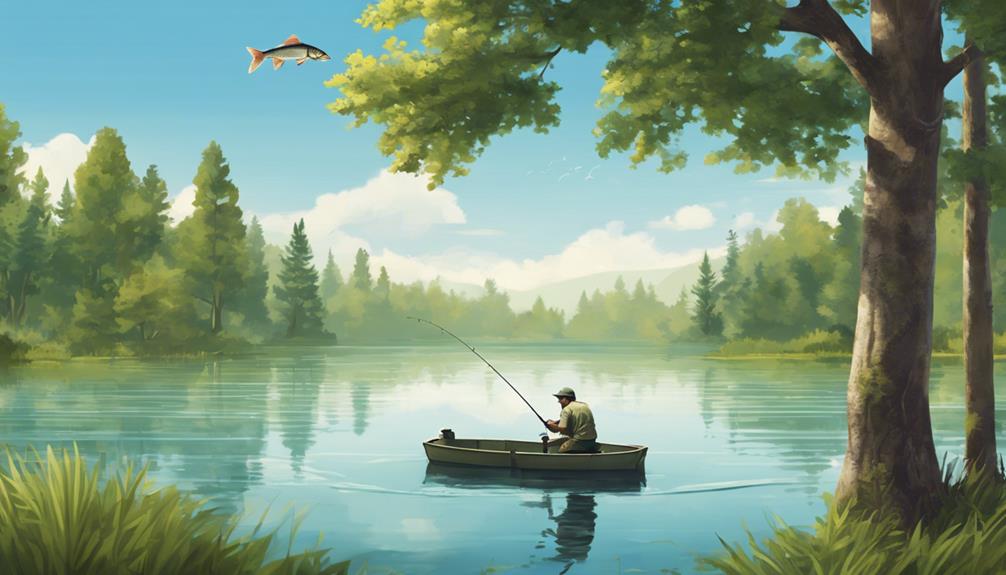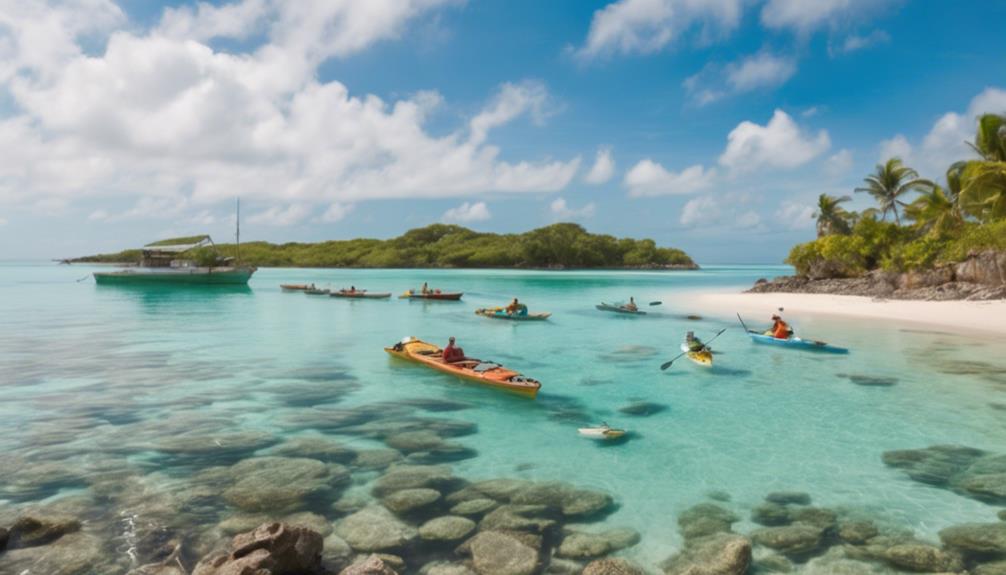You know the saying, 'It takes a village'? Well, when it comes to fishing conservation, community involvement plays a crucial role in safeguarding our aquatic resources.
From raising awareness to actively participating in monitoring efforts, there are numerous ways local communities can contribute to the sustainability of our fisheries.
But how exactly can your involvement make a difference? Let's explore how working together can lead to more effective conservation outcomes and ensure a brighter future for our marine ecosystems.
Building Awareness Through Education
To effectively build awareness through education about fishing conservation, engage local communities in hands-on learning experiences. Education initiatives play a crucial role in spreading awareness about the importance of sustainable fishing practices. By organizing workshops, seminars, and educational campaigns, local communities can learn about the impact of overfishing and the importance of conservation efforts. These initiatives not only educate community members but also empower them to become advocates for responsible fishing practices.
Awareness campaigns are another effective way to educate the public about fishing conservation. Utilizing social media, workshops, and community events, these campaigns can reach a wider audience and spark interest in conservation efforts. By highlighting success stories and showcasing the benefits of sustainable fishing, awareness campaigns can inspire individuals to take action and make a positive impact on marine ecosystems.
Engaging local communities in educational initiatives and awareness campaigns fosters a sense of responsibility and stewardship towards the environment. By providing information on sustainable fishing practices and the importance of conservation, communities can make informed decisions that benefit both the environment and future generations. Through these efforts, individuals can contribute towards preserving marine biodiversity and ensuring the sustainability of fishing resources for years to come.
Strengthening Monitoring Efforts Locally
Strengthen local monitoring efforts by implementing regular community-led patrols and surveillance programs to ensure compliance with fishing regulations and detect any illegal activities. By fostering local partnerships, communities can actively participate in safeguarding their marine resources. These partnerships not only enhance surveillance capabilities but also promote a sense of ownership and responsibility among community members, leading to a more sustainable approach to fishing practices.
Engaging in community-led patrols allows for real-time monitoring of fishing activities, enabling swift responses to any violations. Through these efforts, individuals become directly involved in protecting their local marine ecosystems, fostering a greater understanding of the importance of conservation. Moreover, by working together with local authorities, communities can create a network of support that amplifies the conservation impact of monitoring initiatives.
Implementing Sustainable Practices Together
By implementing sustainable practices together, you and your community can further enhance the protection of marine resources and promote long-term conservation efforts. Building sustainable partnerships within your community is essential for the collective action needed to make a significant impact on fishing conservation. When individuals, local organizations, and businesses come together with a shared goal of preserving marine ecosystems, the potential for positive change multiplies.
Through sustainable partnerships, you can pool resources, knowledge, and expertise to develop effective conservation strategies. Collaborating with others allows for the sharing of best practices and the creation of innovative solutions to tackle conservation challenges. By working together, you can amplify your impact and make a real difference in safeguarding fish populations and their habitats.
Collective action is key to implementing sustainable practices on a broader scale. By mobilizing community members to participate in conservation initiatives, you can create a ripple effect that extends beyond individual efforts. Whether it's organizing beach clean-ups, promoting sustainable fishing practices, or advocating for marine protected areas, every action taken collectively contributes to the greater good.
Enhancing Habitat Restoration Projects
Engage with local stakeholders to revitalize and improve marine habitats in your community. By getting involved in habitat restoration projects, you can make a significant impact on the conservation of fishing resources. Volunteer opportunities are abundant in these projects, allowing you to contribute directly to the enhancement of crucial marine ecosystems. Participating in hands-on activities like planting seagrass, building artificial reefs, or removing invasive species can help restore habitats that support fish populations.
Fundraising events play a vital role in funding restoration initiatives. By organizing or participating in these events, you can secure the necessary resources to carry out habitat restoration projects effectively. Conservation partnerships with local organizations and government agencies can provide additional support and expertise, ensuring that your efforts yield long-lasting benefits for fishing conservation.
Collaborating with like-minded individuals and groups can amplify the impact of habitat restoration initiatives. By working together towards a common goal, you can leverage collective knowledge and resources to achieve greater results. Engaging in community-led projects fosters a sense of ownership and responsibility for marine habitats, instilling a culture of conservation among local residents. Take the initiative to join or create habitat restoration initiatives in your area, and be a driving force for positive change in fishing conservation.
Fostering Collaborative Research Initiatives
Joining forces with researchers and conservationists can lead to innovative solutions for enhancing fishing conservation efforts. Collaborative partnerships between community members and experts in the field can drive research advancements that benefit both fish populations and the ecosystems they inhabit.
By fostering collaborative research initiatives, communities can tap into the expertise of scientists and conservationists to gain a deeper understanding of the issues affecting local fisheries. These partnerships enable the sharing of knowledge, resources, and data, leading to more informed decision-making processes. For example, researchers may provide valuable insights into the impact of climate change on fish habitats, helping communities adapt their conservation strategies accordingly.
Moreover, collaborative research initiatives allow for the development of cutting-edge technologies and methodologies to monitor fish populations and track conservation progress. By working together, community members and researchers can implement innovative solutions such as tagging programs, genetic studies, or underwater monitoring systems. These research advancements not only enhance conservation efforts but also provide valuable data for future initiatives.
Promoting Responsible Fishing Practices
To ensure the sustainability of fish populations, it's crucial to promote responsible fishing practices within the community. Education plays a key role in achieving this goal. By providing fishermen with knowledge about sustainable fishing techniques, catch limits, and the importance of respecting marine habitats, we can help them make informed decisions that benefit both current and future generations. Outreach initiatives are also instrumental in spreading awareness about responsible fishing practices. Through workshops, seminars, and community events, we can engage fishermen directly and encourage them to adopt more sustainable behaviors.
One effective way to promote responsible fishing practices is by organizing educational programs that focus on conservation strategies. These programs can teach fishermen about the impact of overfishing, the importance of following regulations, and the benefits of using selective fishing gear. By empowering fishermen with this knowledge, we can inspire them to become stewards of the ocean and protectors of marine life.
Furthermore, outreach initiatives can involve partnering with local fishing associations and cooperatives to spread the message of responsible fishing practices. By collaborating with these groups, we can reach a wider audience and create a culture of sustainability within the community. Ultimately, promoting responsible fishing practices through education and outreach initiatives is essential for preserving fish populations and maintaining healthy marine ecosystems.
Engaging Youth in Conservation Programs
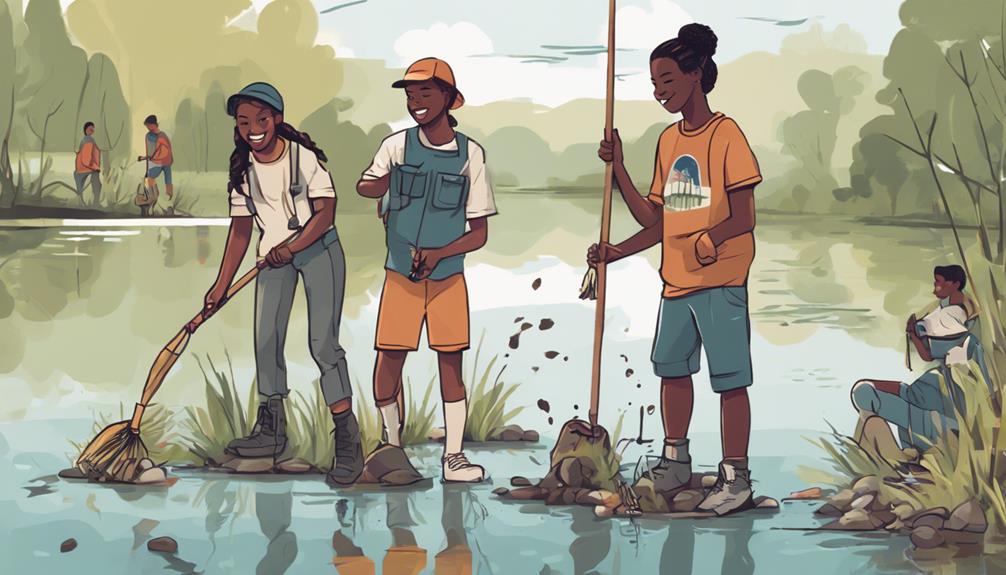
Involving young people in conservation programs can cultivate a lasting commitment to protecting the environment and its resources. Youth engagement in conservation initiatives not only educates the younger generation about the importance of preserving natural habitats but also empowers them to become active participants in creating a sustainable future. By actively involving youth in conservation activities such as beach clean-ups, tree planting, or educational workshops, they develop a sense of responsibility towards the environment and gain firsthand experience of the conservation impact they can make.
Engaging youth in conservation programs can instill valuable skills such as teamwork, leadership, and problem-solving. By participating in hands-on activities, young individuals learn the significance of biodiversity and the delicate balance of ecosystems. This practical knowledge equips them to make informed decisions that contribute to the protection of marine life and habitats. Furthermore, involving youth in conservation efforts fosters a sense of ownership and pride in their local environment, encouraging them to take an active role in preserving and enhancing natural resources for future generations.
Creating a Stronger Fishing Community
Strengthen the fishing community by fostering collaboration and shared stewardship of our marine resources. Building a robust fishing community not only benefits the environment but also enhances the fishing experience for everyone involved.
Here are some key ways to create a stronger fishing community:
- Promote Community Unity: Encourage regular gatherings, events, or online forums where local anglers can come together to share knowledge, experiences, and resources. By fostering a sense of unity, you can create a supportive network that values conservation efforts and sustainable fishing practices.
- Emphasize Conservation Camaraderie: Inspire a culture of conservation camaraderie within the fishing community. Encourage anglers to support each other in conservation initiatives, such as organizing beach clean-ups, participating in habitat restoration projects, or advocating for marine protection policies.
- Share Skills and Knowledge: Organize workshops or skill-sharing sessions where experienced anglers can pass on their knowledge to newcomers. By creating opportunities for learning and mentorship, you can strengthen bonds within the fishing community and ensure the transmission of valuable conservation practices.
- Collaborate on Conservation Projects: Work together on conservation projects that benefit the local marine ecosystem. Whether it's creating artificial reefs, monitoring fish populations, or advocating for sustainable fishing regulations, collaboration is key to making a lasting impact on conservation efforts.
- Celebrate Success Together: Acknowledge and celebrate the achievements of individuals and the community as a whole in promoting fishing conservation. Recognizing and rewarding conservation efforts can foster a sense of pride and motivation within the fishing community, inspiring continued dedication to marine stewardship.
Frequently Asked Questions
How Can Individuals Without Prior Fishing Experience Contribute to Fishing Conservation Efforts Within Their Community?
If you lack fishing experience, you can still help with conservation efforts in your community. Attend education workshops to learn about the ecosystem and how to protect it.
Join volunteer programs to clean up waterways and monitor fish populations. Support outreach campaigns to spread awareness.
Participate in fundraising events to provide resources for conservation projects. Your involvement, no matter your experience level, can make a significant impact on fishing conservation efforts.
What Role Do Local Businesses Play in Supporting Fishing Conservation Initiatives?
Local partnerships with businesses are crucial for supporting fishing conservation initiatives. These collaborations help fund important projects and raise awareness about sustainable practices.
Businesses can also assist in conducting environmental impact assessments to ensure fishing activities aren't harming the ecosystem. By working together, local businesses and conservation efforts can make a significant positive impact on the health of fisheries and aquatic environments.
Are There Specific Policies or Regulations That Community Involvement Can Influence to Improve Fishing Sustainability?
To improve fishing sustainability, your community involvement can influence policies related to conservation strategies. By actively engaging with local authorities and decision-makers, you can advocate for regulations that promote responsible fishing practices and protect marine ecosystems.
Your voice matters in shaping policies that safeguard fish populations and ensure sustainable fishing practices for future generations. Make a difference by participating in discussions and pushing for conservation-focused policies in your area.
How Can Technology Be Integrated Into Community-Based Monitoring and Conservation Efforts?
To integrate technology into community-based monitoring and conservation efforts, consider using apps or devices for data monitoring. These tools can help track fish populations, water quality, and fishing activity. By involving technology, you can gather more accurate and real-time data, enhancing conservation strategies.
Encouraging community members to use these tools fosters a collaborative approach to protecting marine resources. Embrace innovation and connectivity for more effective fishing conservation efforts.
What Are Some Examples of Successful Community-Led Fishing Conservation Projects in Different Regions?
When looking at successful community-led fishing conservation projects in various regions, you'll find innovative approaches and inspiring case studies.
These initiatives showcase the global impact of local engagement in preserving marine life.
Conclusion
By actively participating in your local fishing community, you can make a significant impact on conservation efforts. Through education, monitoring, sustainable practices, habitat restoration, research initiatives, responsible fishing, and youth engagement, you can help protect our oceans and marine life for future generations.
Together, we can create a stronger and more sustainable fishing community that values conservation and environmental stewardship. Get involved and make a difference today!
